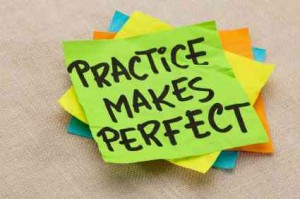Make Marketing Suck Less
8 Steps to Practicing A Presentation
By Michelle Mazur > March 1, 2012
Filed Under Coaching/Feedback
 A speaker who was preparing for a big presentation shocked me when she said “Practicing my presentation scares me more then presenting!” I could hardly believe my ears. I asked her why, and she told me “Everyone tells me that I need to practice, but I just don't know what that looks like.”
A speaker who was preparing for a big presentation shocked me when she said “Practicing my presentation scares me more then presenting!” I could hardly believe my ears. I asked her why, and she told me “Everyone tells me that I need to practice, but I just don't know what that looks like.”
Indeed countless public speaking coaches and trainers tell you to practice your speech. Heck, I even said to practice, practice, practice in my own blog 5 Public Speaking Tips that Build Relationships.
Practicing a presentation is a personal process and one that a speaker has to experiment with to find the process that works best for them. Here is my own 8-step process for preparing to present:
- Preparation begins with conceptualization – When you begin writing your speech, you are in the process of practicing it. Sit down with your PowerPoint or notes. Think about what one thing you want the audience to remember from each point and how to transition between points.
- Internalize don't memorize – Speakers often ask if I memorize my presentations. The answer is that I internalize not memorize. I know the stories I want to tell or the points I want to highlight but my goal is to present it in a conversational tone and not to recite from a script.
- Present out loud – Many speakers tell me that they read through their presentation but never speak it out loud. Reading and speaking your presentation are two different things. You need to say your speech out loud to know how it sounds, where transitions are rocky, and to discover any points or stories that don't fit.
- Present standing up – I practice my presentation standing up in my hotel room. If room service were to enter, they would think I have lost my mind. However, I want to practice my gestures and how I am going to move.
- Present in the clothes you are going to wear – To me this makes my practice real. It also tells me if the arms of suit jacket are too tight and I can't raise my arm above my head.
- Time it – Plan out how much time you want to spend on each point or slide. Then time it when you practice. Too short? Too long? Remember audiences do mind if you go over time!
- See where you are presenting – If there is any way to see the room where you are presenting, do it! It will better prepare you to do well and also test the technology in the room.
- Visualize your success – Whether I am practicing in my hotel room or in the car, I visualize that I am on the stage and can see the audience. I visualize doing well. By the time I take the stage, I've given my presentation successfully numerous times.
This is my process for practicing a speech or presentation. All speakers are different. Craig Valentine provides his pre-presentation rituals and Ellen Bremen, The Chatty Professor, explains how she prepares for a speech.
What are you practice tips when getting ready for that big meeting or presentation? Share your thoughts below. If you liked this article, please feel free to share it!
P.S. Need more tips on how to practice your presentation in less time while easing your mind? Download the No Sweat Speech Prep Guide.
Create Your One-of-a-Kind Message
Your 3 Word Rebellion is the Key to Growing Your Business & Impact






